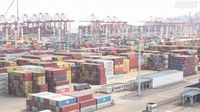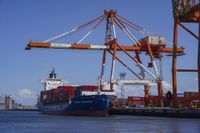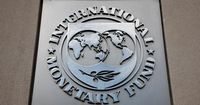The International Monetary Fund (IMF) has significantly revised its global economic growth forecasts, reflecting the adverse effects of U.S. tariffs on economies worldwide. On April 22, 2025, the IMF announced that the world economy is expected to grow by only 2.8% this year, a decrease of 0.5 percentage points from its previous forecast made in January. The IMF also projected a 3.0% growth rate for 2026, down 0.3 percentage points from earlier estimates.
These adjustments are largely attributed to the trade tensions stemming from the Trump administration's tariff policies, which have created a complex and fluid economic environment. IMF Chief Economist Pierre-Olivier Gourinchas emphasized the significance of these changes, stating, "The world is about to enter a new era. The economic system that has functioned for the past 80 years is being reset." This shift indicates a fundamental transformation in global trade dynamics.
In its report, the IMF highlighted that nearly all countries have seen their growth forecasts downgraded due to the ongoing trade war. For instance, the U.S. growth forecast for 2025 has been reduced to 1.8%, a notable decline of 0.9 percentage points. The IMF attributed this downward revision to increasing policy uncertainty and escalating trade tensions, which are expected to weaken demand growth.
Moreover, the IMF's analysis indicates that inflation rates are anticipated to rise more than previously expected, reaching 4.3% in 2025 and 3.6% in 2026. This inflationary pressure is primarily driven by the tariff impacts on various goods, which are likely to suppress consumer spending and corporate investment. Gourinchas warned that as trade frictions escalate, the uncertainty surrounding economic conditions will only intensify, leading to increased volatility in financial markets.
China, another major player in the global economy, is projected to experience a growth rate of 4.0% for both 2025 and 2026, down 0.6 and 0.5 percentage points respectively. The IMF cited trade stagnation as a critical factor in this revision, reflecting the broader impacts of the U.S.-China trade conflict. The report also noted that the effective tariff rate imposed by the U.S. has surged to its highest level in a century, exacerbating the economic strain on both nations.
Japan's growth forecast has similarly been adjusted downward to 0.6%, a reduction of 0.5 percentage points. The IMF indicated that the tariffs, particularly on automobiles, are significantly affecting Japan's export-driven economy. The introduction of a 25% tariff on U.S.-bound vehicles, effective April 3, 2025, poses a substantial threat to Japan's automotive sector, which heavily relies on the U.S. market.
In contrast, the IMF anticipates that if trade tensions are alleviated and long-standing concerns regarding trade barriers are addressed, the global economic outlook could improve. However, the immediate future remains precarious, with the risk of further deterioration in trade relations looming large. The IMF has also revised its global trade growth forecast downward by 1.5 percentage points for this year, indicating a challenging environment ahead.
Countries like Mexico and Canada are also feeling the effects of these tariffs, with Mexico's growth rate expected to plummet to -0.3%, a staggering 1.7 percentage point decrease. Canada is not far behind, with its growth forecast lowered to 1.4%. Both nations, heavily reliant on exports to the U.S., face significant challenges as they navigate the repercussions of the ongoing trade disputes.
In Europe, the economic outlook is similarly bleak, with Germany's growth forecast adjusted to 0.0% and France's to 0.6%, both reflecting downward revisions. The IMF has noted that inflation in advanced economies is projected to reach 2.5% in 2025, a 0.4 percentage point increase from previous estimates, driven by rising prices in the U.S. following tariff implementations.
As the global economic landscape shifts, the IMF's report serves as a stark reminder of the interconnectedness of international markets and the ripple effects that trade policies can have on economic growth. The organization has positioned its latest outlook as a "tentative forecast," suggesting that the situation remains fluid and subject to change as new developments arise.
In summary, the IMF's latest World Economic Outlook underscores the significant challenges facing the global economy as it grapples with the ramifications of trade wars and tariff policies. With growth forecasts lowered across the board, the potential for a prolonged period of economic uncertainty looms, prompting policymakers to consider strategies to mitigate the impacts of these developments.









